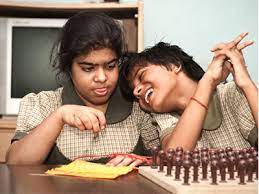
Homeopathic Treatment of Mental Retardation
Intellectual disability (ID), once called mental retardation, is characterized by below-average intelligence or mental ability and a lack of skills necessary for day-to-day living. People with intellectual disabilities can and do learn new skills, but they learn them more slowly. There are varying degrees of intellectual disability, from mild to profound.
Mental retardation (MR) is a condition diagnosed before age 18, usually in infancy. When onset occurs at age 18 or after, it is called dementia, which can coexist with a MR diagnosis. Intelligence level as determined by individual standard assessment is below 70, and the ability to adapt to the demands of normal life is impaired. This is important because it distinguishes a diagnosis of MR from individuals with low IQ scores who are able to adapt to the demands of everyday life.
Someone with intellectual disability has limitations in two areas. These areas are:
Intellectual functioning: Also known as IQ, this refers to a person’s ability to learn, reason, make decisions, and solve problems.
Adaptive behaviors: These are skills necessary for day-to-day life, such as being able to communicate effectively, interact with others, and take care of oneself.
Causes of Mental Retardation:
Anytime something interferes with normal brain development, intellectual disability can result. However, a specific cause for intellectual disability can only be pinpointed about a third of the time.
The most common causes of intellectual disability are:
Genetic conditions: These result from abnormality of genes inherited from parents, errors when genes combine, or from other disorders of the genes caused during pregnancy by infections, overexposure to x-rays and other factors. Inborn errors of metabolism which may produce mental retardation, such as PKU (phenylketonuria), fall in this category. Chromosomal abnormalities have likewise been related to some forms of mental retardation, such as Down syndrome and fragile X syndrome.
Problems during pregnancy: Use of alcohol or drugs by the pregnant mother can cause mental retardation. Malnutrition, rubella, glandular disorders and diabetes, cytomegalovirus, and many other illness of the mother during pregnancy may result in a child being born with mental retardation. Physical malformations of the brain and HIV infection originating in prenatal life may also result in mental retardation.
Problems at birth: Although any birth condition of unusual stress may injure the infant’s brain, prematurity and low birth weight predict serious problems more often than any other conditions.
Problems after birth: Childhood diseases such as whooping cough, chicken pox, measles, and Hib disease which may lead to meningitis and encephalitis can damage the brain, as can accidents such as a blow to the head or near drowning. Substances such as lead and mercury can cause irreparable damage to the brain and nervous system.
Poverty and cultural deprivation: Children in poor families may become mentally retarded because of malnutrition, disease-producing conditions, inadequate medical care and environmental health hazards. Also, children in disadvantaged areas may be deprived of many common cultural and day- to-day experiences provided to other youngsters. Research suggests that such under-stimulation can result in irreversible damage and can serve as a cause of mental retardation.
Illness or injury: Infections like meningitis, whooping cough, or the measles can lead to intellectual disability. Severe head injury, near-drowning, extreme malnutrition, exposure to toxic substances such as lead, and severe neglect or abuse can also cause
Symptoms of Mental Retardation:
There are many different signs of intellectual disability in children. Signs may appear during infancy, or they may not be noticeable until a child reaches school age. It often depends on the severity of the disability. Some of the most common signs of intellectual disability are:
Diagnosis of Mental Retardation:
Mental retardation is diagnosed by looking at two main things. These are:
Intellectual functioning, or IQ, is usually measured by a test called an IQ test. The average score is 100. People scoring below 70 to 75 are thought to have mental retardation. To measure adaptive behavior, professionals look at what a child can do in comparison to other children of his or her age. Certain skills are important to adaptive behavior.
These are:
Treatment of Mental Retardation:
The primary goal of treatment is to develop the person's potential to the fullest. Special education and training may begin as early as infancy. This includes social skills to help the person function as normally as possible.
It is important for a specialist to evaluate the person for other affective disorders and treat those disorders. Behavioral approaches are important for people with mental retardation.
Homeopathic Treatment of Mental Retardation:
Homeopathy is one of the most popular holistic systems of medicine. The selection of remedy is based upon the theory of individualization and symptoms similarity by using holistic approach. This is the only way through which a state of complete health can be regained by removing all the sign and symptoms from which the patient is suffering. The aim of homeopathy is not only to treat but to address its underlying cause and individual susceptibility. As far as therapeutic medication is concerned, several remedies are available to treat mental retardation in children that can be selected on the basis of cause, sensations and modalities of the complaints.
Steps to help your intellectually disabled child include: